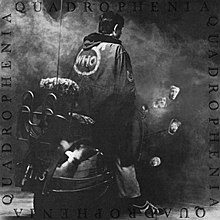
Back Quadrophenia Czech Quadrophenia Danish Quadrophenia German Quadrophenia Greek Quadrophenia Spanish Quadrophenia Finnish Quadrophenia (album) French Quadrophenia HE Quadrophenia Italian 四重人格 Japanese
| Quadrophenia | ||||
|---|---|---|---|---|
 | ||||
| Studio album by | ||||
| Released | 26 October 1973 | |||
| Recorded |
| |||
| Studio | Olympic, Ramport and Ronnie Lane's Mobile Studio, London | |||
| Genre | ||||
| Length | 81:42 | |||
| Label | Polydor/Track (UK) Track/MCA (US) | |||
| Producer | The Who | |||
| The Who chronology | ||||
| ||||
| Singles from Quadrophenia | ||||
| ||||
Quadrophenia is the sixth studio album by the English rock band the Who, released as a double album on 26 October 1973[4] by Track Records. It is the group's third rock opera, the previous two being the "mini-opera" song "A Quick One, While He's Away" (1966) and the album Tommy (1969). Set in London and Brighton in 1965, the story follows a young mod named Jimmy and his search for self-worth and importance. Quadrophenia is the only Who album entirely written & composed by Pete Townshend.
The group started work on the album in 1972 in an attempt to follow up Tommy and Who's Next (1971), both of which had achieved substantial critical and commercial success. Recording was delayed while bassist John Entwistle and singer Roger Daltrey recorded solo albums and drummer Keith Moon worked on films. Because a new studio was not finished in time, the group had to use Ronnie Lane's Mobile Studio. The album makes significant use of Townshend's multi-track synthesizers and sound effects, as well as Entwistle's layered horn parts. Relationships between the group and manager Kit Lambert broke down irretrievably during recording and Lambert had left the band's service by the time the album was released.
Quadrophenia was released to a positive reception in both the UK and the US, but the resulting tour was marred with problems with backing tapes replacing the additional instruments on the album, and the stage piece was retired in early 1974. It was revived in 1996 with a larger ensemble, and a further tour took place in 2012. The album made a positive impact on the mod revival movement of the late 1970s, and the resulting 1979 film adaptation was successful. The album has been reissued on compact disc several times, and seen several remixes that corrected some perceived flaws in the original release.
- ^ Barker, Emily (24 October 2013). "The 500 Greatest Albums of All Time: 300-201". NME. Archived from the original on 5 April 2019. Retrieved 1 June 2020.
- ^ Kemp, Mark (2004). "The Who". In Brackett, Nathan; Hoard, Christian (eds.). The New Rolling Stone Album Guide (4th ed.). Simon & Schuster. pp. 871–873. ISBN 0-7432-0169-8.
- ^ Segretto, Mike (2022). "1973". 33 1/3 Revolutions Per Minute – A Critical Trip Through the Rock LP Era, 1955–1999. Backbeat. pp. 293–294. ISBN 9781493064601.
- ^ Unterberger 2011, p. 232.
© MMXXIII Rich X Search. We shall prevail. All rights reserved. Rich X Search